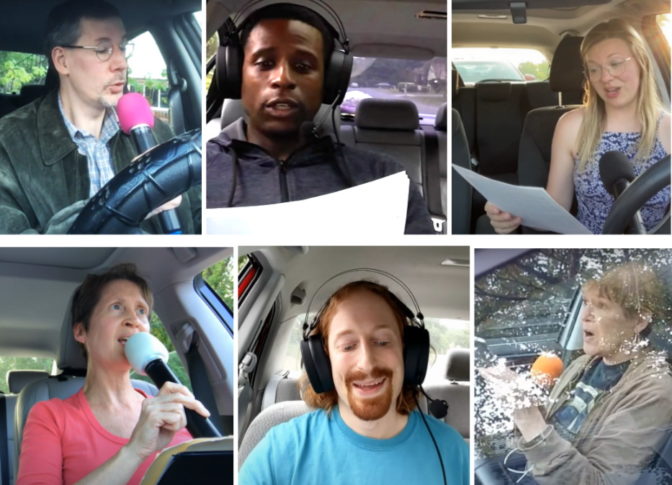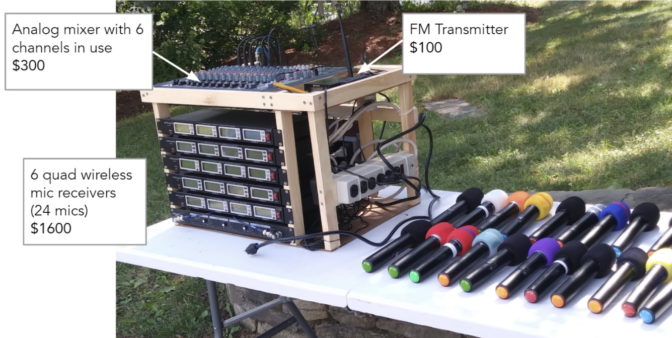Music and engineering were completely separate parts of Bryce Denney’s life until the pandemic hit.
By day, the Massachusetts-based NVIDIA engineer helped test processors. On nights and weekends, he played piano chamber music and accompanied theater troupes that his wife, Kathryn, sang in or led.
It was a good balance for someone who graduated with a dual major in physics and piano performance.
Once COVID-19 arrived, “we had to take the calendar off the wall — it was too depressing to look at everything that was canceled,” Bryce said.
“I had this aimless sense of not feeling sure who I was anymore,” said Kathryn, a former public school teacher who plays French horn and conducts high school and community theater groups. “This time last year I was working in five shows and a choir that was preparing for a tour of Spain,” she said.
That’s when Bryce got an idea for some musical engineering.
Getting Wired for Sound
He wanted to help musicians in separate spaces hear each other without nagging delays. As a proof of concept, he ran cables for mics and headphones from a downstairs piano to an upstairs bedroom where Kathryn played her horn.
The duet’s success led to convening a quartet from Kathryn’s choir in the driveway, singing safely distanced in separate cars with wired headsets linked to a small mixer. The Driveway Choir was born.

“We could hear each other breathe and we joked back and forth,” said Kathryn.
“It was like an actual rehearsal again and so much more rewarding” than Zoom events or virtual choirs where members recorded one part at a time and mixed them together, said Bryce.
But it would take a rat’s nest of wires to link a full choir of 20 singers, so Bryce boned up on wireless audio engineering.
Physics to the Rescue
He reached out to people like David Newman, a voice teacher at James Madison University, who was also experimenting with choirs in cars. And he got tips about wireless mics that are inexpensive and easy to clean.
Newman and others coached him on broadcasting over FM frequencies, and how to choose bands to avoid interference from local TV stations.
“It was an excuse to get into physics again,” said Bryce.
Within a few weeks he assembled a system and created a site for his driveway choir, where he posted videos of events, a spreadsheet of options for configuring a system, and packing lists for how to take it on the road. A basic setup for 16 singers costs $1,500 and can scale up to accommodate 24 voices.
“Our goal is to make this accessible to other groups, so we choose less-expensive equipment and write out a step-by-step process,” said Kathryn, who has helped organize 15 events using the gear.
Jan Helbers, a neighbor with wireless expertise, chipped in by designing an antenna distribution system that can sit on top of a car on rainy days.
Bryce posted instructions on how to build it for about $300 complete with a bill of materials and pictures of the best RF connectors to use. A commercial antenna distribution system of this size would cost thousands.
“I was excited about that because here in Marlborough it will be snowy soon and we want to keep singing,” said Bryce.
From Alaska to the Times
The Denneys helped the choir at St. Anne’s Episcopal church in nearby Lincoln, Mass., have its first live rehearsal in four months and record a track used in a Sunday service. Now the choir is putting together its own system.
The church is one of at least 10 groups that have contacted the Denneys about creating driveway choirs of their own, including one in Alaska. They expect more calls after a New York Times reporter joined one of their recent events and wrote a story about his experience.
There’s no shortage of ideas for what’s next. Driveway choirs for nursing homes, singalongs in big mall parking lots or drive-in theaters, Christmas caroling for neighbors.
“I wouldn’t be surprised if we did a Messiah sing,” said Kathryn, who has been using some of her shelter-in-place time to start writing a musical called Connected.
“I think about that song, ‘How Can I Keep from Singing,’ that’s the story of our lives,” she said.

At top: Kathryn conducts and Bryce plays piano at a Driveway Choir event with 24 singers in Concord, MA.
The post Turn Your Radio On: NVIDIA Engineer Creates COVID-Safe Choirs in Cars appeared first on The Official NVIDIA Blog.
